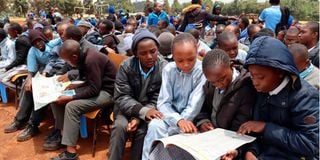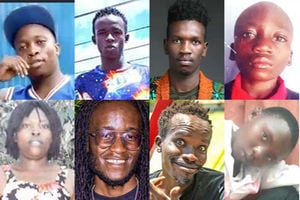CBC is here to stay, High Court rules

Learners at PCEA Kanjeru Primary School look at a model CBC KPSEA exam paper published in the Juniorspot pullout.
What you need to know:
- High Court judges said scrapping CBC would offend the children’s right to education.
- Court dismissed claims that there was no public participation before CBC's implementation.
The competency-based curriculum (CBC) is here to stay, the High Court has ruled.
A three-judge bench ruled that CBC aims at equipping learners with essential skills.
The bench said CBC has been under implementation since 2019 and scrapping it would create confusion in the education sector.
"It is evident that the Competency-Based Curriculum has already been rolled out and the teachers undergone training. The government has already set out finances for the implementation. Stopping implementation will cause havoc in the education system", the judges said.
The High Court directed the Cabinet Secretary for Education to formulate laws to align CBC with legal structures within 120 days.
The ministry has drafted some amendment Bills but they are yet to get Cabinet approval before being table in Parliament.
Judges Hedwiq Ong'udi, John Chigiti and Antony Ndung'u also directed the Ministry of Education to set up a committee for the implementation of the report of the Presidential Working Party on Education Reforms (PWPER).
The judges said they were satisfied that the shift to CBC is necessary to ensure skills are imparted to learners.
While dismissing the petition filed by former Law Society of Kenya (LSK) president Nelson Havi, the bench ruled that the petitioner failed to prove his case which sought to have CBC scrapped and the 8-4-4 system reinstated.
The High Court judges further said scrapping CBC would offend the children’s right to education and would also be against public interest.
The judges said their decision was based on the interest of the children and that granting the orders sought by Mr Havi would cause disorder in the education system.
They noted that there had been serious public engagement on CBC with various interested groups including, faith-based organisations, the general public and key stakeholders in education and therefore it achieved the legal threshold for public participation.
The court dismissed claims by Mr Havi that there was no public participation before the implementation of CBC.
"The best interest of the child is a paramount consideration. A court must do everything to preserve the rights of minors," the court ruled.
The court also noted that scrapping CBC would lead to loss of jobs and wastage of taxpayers’ money that has already been used in CBC's implementation.
"What will the be results of nullifying the CBC? Will it be in the best interest of the child to make him forget what he has learnt to learn something else?" the bench posed.
The initial petitioner in the matter was Esther Ang'awa, also an advocate of the High Court, who filed the case in in 2021.
However, she opted out of the matter on claims that she had been profiled by the State. She had sued as a parent and was represented in the case by Mr Havi.
Her name was substituted with that of Mr Havi and documents before the court were subsequently amended to indicate the latter as the petitioner.
The national rollout of the CBC commenced in January 2019 at Pre-Primary I and II and Grades 1, 2 and 3 in lower primary.
The pioneer class is currently in Grade 8 in junior school. They will join senior school in January 2025.
The 2-6-3-3-3 curriculum was billed as a game-changer in the country’s education as it changed the teaching methodology as well as a review of curriculum content to solve challenges witnessed under the 8-4-4 system.
The 8-4-4 education system was majorly blamed for rote learning.
However, the government was faulted for failing to demonstrate that it initiated and conducted research to inform the national government of the CBC curriculum among other things.





